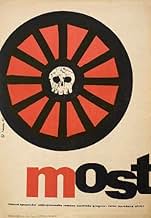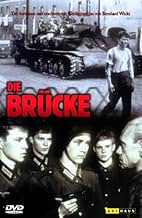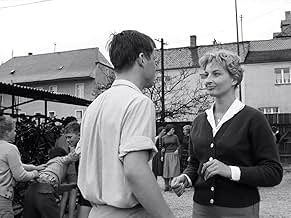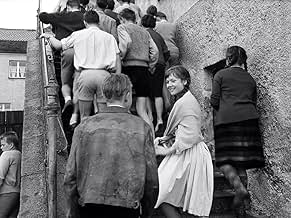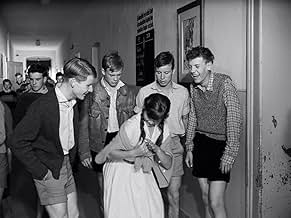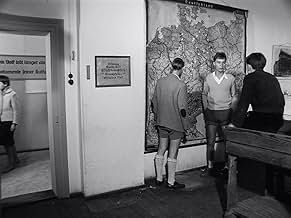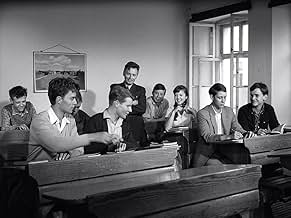IMDb-BEWERTUNG
7,9/10
9066
IHRE BEWERTUNG
1945, Deutschland liegt am Boden und niemand ist mehr da, um zu kämpfen, außer ein paar junge Spinte im Teenageralter.1945, Deutschland liegt am Boden und niemand ist mehr da, um zu kämpfen, außer ein paar junge Spinte im Teenageralter.1945, Deutschland liegt am Boden und niemand ist mehr da, um zu kämpfen, außer ein paar junge Spinte im Teenageralter.
- Für 1 Oscar nominiert
- 16 Gewinne & 1 Nominierung insgesamt
Volker Bohnet
- Hans Scholten
- (as Folker Bohnet)
Günter Hoffmann
- Sigi Bernhard
- (as Günther Hoffmann)
Empfohlene Bewertungen
We were shown this movie at school, so I always remembered it as a politically correct piece educational film - which it is, in a way. This is film with a clear purpose. It wants you to learn something. The amazing thing is that it is also a good film. Its message "War Is Bad" is brought across not so much by showing blood, death and destruction but by the means of classical tragedy: There are no "bad guys" in this film; on the contrary, most people try to do good, be humane. (E.g. the boys are told to guard the bridge in order to keep them away from the front.) But what they do results in disaster, because the evil is war itself.
10bugs-32
In my opinion is the best war film I've ever seen. The story is one o the best examples of the nonsense and madness of war. Seems incredible that this movie has been done by Germany and released after 14 years since the end of the war. You can see a traumatic passage from childhood to maturity in the principal characters. The film is from the late fifties so there is no big special effects like "saving private Ryan". Also, the movie is not showing a major and historical battle, with a lot of soldiers and tanks fighting between explosions. In fact,the war scenes can be seen only in the last half hour. The final scene on the bridge is one of the most disturbing scenes of war films.
I lived through that time, I was seventeen, and I know fourteen year olds were fighting to the last " boy ". The realism of this film still takes me back to '45. It happened that way.
When I saw in news accounts the lovely yet fearful face of a 16 year-old, who had defected from the Taliban during the campaign against terrorists in Afghanistan, in the aftermath of the 9/11, I was taken back to Bernhard Wicki's Die Brücke (The Bridge), to the faces of young German boys who were recruited by the Nazis to defend a "last" bridgehead, in the final days of World War II in Europe. In both cases, young "true believers" were used as cannon fodder by cynical adults in their futile power games, which they had disguised as moral crusades.
A tiny band of boys, holding weapons as big as they, their bodies and faces still soft and fresh and tight, facing the juggernaut of tanks and artillery and machine guns which we know will soon tear them to pieces. And for what? An ideal?
I suspect that The Bridge was the basis for the Timothy Hutton, Sean Penn vehicle, "Taps". However, The Bridge is the starker and more brutal treatment because, unlike the what-if story of Taps, the what-if does not apply to The Bridge. In fact, throughout history, the use of children in furtherance of warfare has a sickening frequency, the earliest I know of being the Children's Crusade, and now we have the Tamil Tigers (little girls with lockets of cyanide vials) and Palestinian boy bombs.
The Bridge deserves to be revived and shown to as wide an audience as possible in this Dastardly New World we live in.
A tiny band of boys, holding weapons as big as they, their bodies and faces still soft and fresh and tight, facing the juggernaut of tanks and artillery and machine guns which we know will soon tear them to pieces. And for what? An ideal?
I suspect that The Bridge was the basis for the Timothy Hutton, Sean Penn vehicle, "Taps". However, The Bridge is the starker and more brutal treatment because, unlike the what-if story of Taps, the what-if does not apply to The Bridge. In fact, throughout history, the use of children in furtherance of warfare has a sickening frequency, the earliest I know of being the Children's Crusade, and now we have the Tamil Tigers (little girls with lockets of cyanide vials) and Palestinian boy bombs.
The Bridge deserves to be revived and shown to as wide an audience as possible in this Dastardly New World we live in.
German war drama from Deutsche Film Hansa and director Bernhard Wicki. In the waning days of WW2, a group of German high school friends all get drafted into the army, much to their excitement. However, with literally only a single day's worth of training, they are sent to their hometown to guard a small bridge until it can be destroyed by a demolition crew. The young men take their task very seriously, leading to tragic results
The 100 minutes film spends the first hour establishing the characters of each of the young men, so that the frenetic last act becomes even more devastating, as these are fully fleshed out individuals instead of the too-frequent ciphers and cliches found in many war films. The tone is distinctly anti-war, but the movie is never preachy, and the futility of their actions is made apparent naturally, without contrivance. The filmmaking in the final stretch of the film is ahead of its time in the use of rapid edits, traveling camera shots, and zooms. The movie was nominated for the Best Foreign Language Film Oscar (it lost to Black Orpheus). Recommended.
The 100 minutes film spends the first hour establishing the characters of each of the young men, so that the frenetic last act becomes even more devastating, as these are fully fleshed out individuals instead of the too-frequent ciphers and cliches found in many war films. The tone is distinctly anti-war, but the movie is never preachy, and the futility of their actions is made apparent naturally, without contrivance. The filmmaking in the final stretch of the film is ahead of its time in the use of rapid edits, traveling camera shots, and zooms. The movie was nominated for the Best Foreign Language Film Oscar (it lost to Black Orpheus). Recommended.
Wusstest du schon
- WissenswertesThe end credits suggest that the story relates to true events which supposedly happened on "April 27, 1945", but this specific story is fictitious, while the general use of teenage boys as soldiers in the last days of the Third Reich is accurate.
- PatzerWhen the boys are assembled at night, they are told they will be part of the 336th Division. That unit was destroyed and surrendered to the Soviets on the Eastern Front nearly a year earlier in 1944 and was never reformed.
- Zitate
Sigi Bernhard: Whoever defends one square foot of German soil defends Germany!
- Alternative VersionenAn English dubbed version was released in the USA in 1963.
- VerbindungenEdited into Bernhard Victor Christoph Carl von Bülow genannt Loriot (2008)
Top-Auswahl
Melde dich zum Bewerten an und greife auf die Watchlist für personalisierte Empfehlungen zu.
Details
- Laufzeit1 Stunde 43 Minuten
- Farbe
- Sound-Mix
Zu dieser Seite beitragen
Bearbeitung vorschlagen oder fehlenden Inhalt hinzufügen

